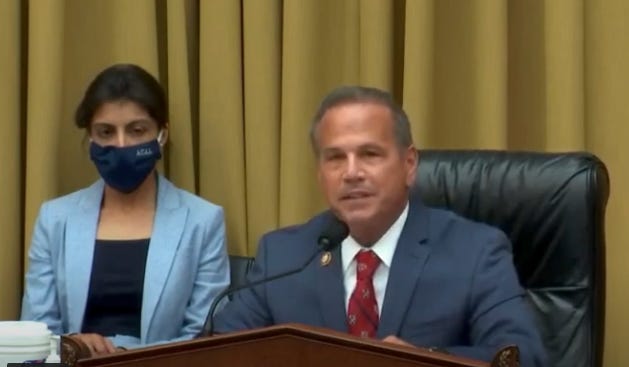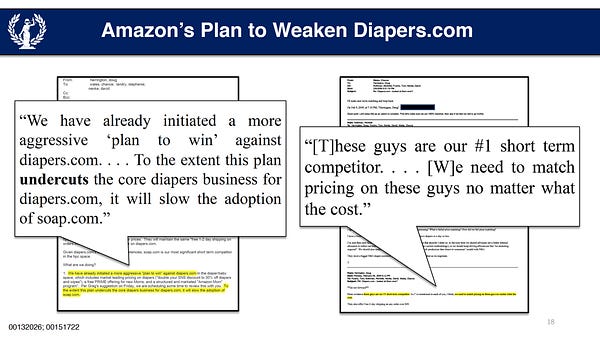The Slow Erosion of Amazon's Power
Amazon is curtailing its private label business in response to regulatory pressure. But it's also promoting one of its more predatory executives. Two steps forward, one step back.
Welcome to BIG, a newsletter on the politics of monopoly power. If you’d like to sign up to receive issues over email, you can do so here.
Today is a short piece on how Amazon is gradually being restrained, but in a “two steps forward, one step back” manner.

Amazon Restrained
It often feels hopeless and pointless to make arguments for restraining corporate power - cynicism is the biggest obstacle to political change. But today I’m going to explain why the broad public suspicion of big tech, and the coincident action by policymakers, is having a meaningful impact on Amazon’s behavior.
A few days ago, the Wall Street Journal reported on Amazon’s changing business strategy.
Amazon has started drastically reducing the number of items it sells under its own brands, and the company has discussed the possibility of exiting the private-label business entirely to alleviate regulatory pressure, according to people familiar with the matter. Amazon’s private-label business, with 243,000 products across 45 different house brands as of 2020, has been a source of controversy because it competes with other sellers on its platform.
Amazon’s private label brands have been a significant problem for third party sellers for years. What Amazon has done is use the surveillance data it has over its marketplace to see what unique items sell, and then copy those items under its own set of brands. It’s hard to convey the fear and frustration of merchants on Amazon’s platform, knowing as they do that at any moment their key partner can down rank their listings and up rank its own. A Sword of Damocles hangs over anyone who wants to sell through Amazon at this point, which pretty much means most (though not all) businesspeople who sell online.
What’s interesting is that, over the last eight years, this tactic has become a policy problem for Amazon, spurring government investigations and lawsuits. The results are internal discussions within Amazon on the merits of entirely exiting the private label business. The corporation’s decision-making is still unclear, it may simply cut bait on most private label items, and retain 10-20% of those that are the most profitable. Or it may be holding out this concession to regulators as a settlement of an antitrust suit. Regardless, Amazon choosing to at least partially refrain from predatory behavior on its platform is a win.
There are an endless number of cliches about how long it takes to accomplish things in politics. This week, National Economic Council Director Brian Deese gave a speech on the Biden administration’s approach to addressing the concentration crisis of the last forty years. “Reversing these trends,” he said, “is a significant task. It amounts to turning around the proverbial aircraft carrier. But now, one year in, we can begin to see the ship turning in the right direction”
And while the Biden administration is generally incoherent on competition policy, what Deese said is correct. Take, for instance, the re-regulation of the ocean carrier industry earlier this year as a result of the crisis at the ports. Exporters and shippers are absolutely delighted. There is now a cop on the beat to stop the systemic bullying of corporations who need to import or export things. As Agriculture Transportation Coalition Executive Director Peter Friedmann noted, for his industry, such a change “cannot be overestimated” Already ocean carriers are changing their behavior with unfair fees, and dedicating more ships to pick up exports.
Policy does change firm behavior, even if it takes time to implement. And with that, let’s go back to the long slow road to hold back Amazon. I’ll date the modern push on the dominant e-commerce giant to 2014. “Before we speak ill of Amazon, let us kneel down before it.” So wrote New Republic editor Franklin Foer in a 2014 cover story titled “Amazon Must Be Stopped: The Argument for Busting Up the Country’s Most Disruptive Company.” That was eight years ago, a few years after the financial crisis caused by Too Big to Fail banks, when analysts had started recognizing the threat Amazon posed to American society. That wasn’t the only article going at Amazon; George Packer of the New Yorker argued Amazon was destroying the American culture of arts and letters. (In my own meager way, that year I tossed a plan to break up the firm.)
The movement accelerated. In 2016, Dave Dayen in the New Republic wrote a cover story on monopoly power, followed by Senator Elizabeth Warren giving a major speech on the issue, in which she criticized Amazon’s preferencing of its own products on its platform. In 2017, scholar Lina Khan wrote an influential paper titled Amazon’s Antitrust Paradox, laying out the power of Amazon and tracing it to changes in antitrust law over the last forty years.
Khan made a number of important observations, tracing Amazon’s power to its ability to price its goods below cost in order to destroy competitors, what is known as ‘predatory pricing.’ She highlighted one particular example, where Amazon lost money in order to underprice its fast-growing rival Quidsi, which ran Diapers.com. Amazon demanded the firm sell out to them. Quidsi execs realized they could not stay in business on their own, that Amazon would be willing to lose any amount of money to destroy them. So they sold out to Amazon, which shut the company down and raised prices on diapers after it eliminated its competitor. Such illegal activity used to be rare, Khan noted, but the Supreme Court made it difficult to bring predatory pricing claims in the 1970s and 1980s.
Khan also showed how Amazon used its surveillance over its marketplace to introduce private label goods. Unlike brick and mortar stores who sold their own private label brands, Amazon had access to far more data, and served as a third party channel for sellers. As such, when it introduced its own private label products, it could "increase sales while shedding risk. It is third-party sellers who bear the initial costs and uncertainties when introducing new products; by merely spotting them, Amazon gets to sell products only once their success has been tested.”
In 2019-2020, Khan became an investigator for the House House Antitrust Subcommittee under Chair David Cicilline, and the subcommittee was able to get internal documents and depose Amazon executives on these very points. Cicilline’s subcommittee put Bezos on the hot seat, and in an embarrassing admission, Bezos told the subcommittee that Amazon might be using private data to undercut its third party sellers. Third party sellers and Amazon’s rivals couldn’t get enough of the investigation, and the final report is still ricocheting in lawsuits all over the world.
BIG is a reader-supported newsletter focused on the politics of monopoly and finance. This is journalism and advocacy that challenges power, so please consider a paid subscription. You can always get lies for free. The truth costs a few bucks, but in the long run it’s much cheaper.
The subcommittee also got the specific emails and data behind Amazon’s predatory attack on rivals. An Amazon executive named Doug Herrington crafted a strategy that cost $200 million to destroy Quidsi, which owned Diapers.com, using the predatory pricing mechanism Khan outlined in her paper.
“We have already initiated a more aggressive ‘plan to win’ against diapers.com,” Herrington wrote. “To the extent that this plan undercuts the core diapers business for diapers.com, it will slow the adoption of Soap.com,” another company owned by Quidsi.
Herrington called Quidsi Amazon’s No. 1 short-term competitor. “We need to match pricing on these guys no matter what the cost,” he said in the email.


Since this series of admissions, there have been a number of policy shifts. The European Union is investigating Amazon’s use of third party data, and Amazon has offered to limit its use of third party data in Europe as a concession to regulators. The Indian antitrust agency raided Amazon earlier this year. And the Federal Trade Commission, where Khan is now the Chair, is investigating on multiple fronts. Meanwhile, Congress is considering a bill whose purpose is to bar self-preferencing, though it is looking increasingly likely that Democratic Senate Majority leader Senator Chuck Schumer is, so far, simply killing the bill by refusing to hold a vote.
There are a lot of problems in working to revive antitrust and competition policy. Large swaths of the civil staff inside government are openly hostile to the project, and much of the Republican and Democratic establishments are basically uninterested, unable to square their culture-focused political goals with any coherent political economy views. And we can see that because the Amazon official behind the openly illegal predatory pricing scheme to kill Diapers.com - Doug Herrington - was just promoted to run the entire retail arm of Amazon. We have a severe crisis with the rule of law, and that Herrington has now amassed more internal power at Amazon despite being exposed as a mob-boss style conspirator, suggests that this crisis is only starting to be addressed.
Still, in exercising the muscles required to address concentrations of economic power, we are learning not just how flabby and weak they are, but also that they can get stronger. Millions of people know about monopoly power, when just a few years ago, they did not. And that pushes policymakers, which in turn push large firms. Ultimately, the point of these policy changes is to actually shift the marketplace, and that looks like it’s happening. Tens of thousands of business people will be able to breath a small sigh of relief when Amazon pulls back from its private label strategy.
And that’s something to be grateful for. It’s also not nearly enough.
Thanks for reading. Send me tips on weird monopolies, stories I’ve missed, or comments by clicking on the title of this newsletter. And if you liked this issue of BIG, you can sign up here for more issues of BIG, a newsletter on how to restore fair commerce, innovation and democracy. If you really liked it, read my book, Goliath: The 100-Year War Between Monopoly Power and Democracy.
cheers,
Matt Stoller


Amazon charges very high fees to sell on their site. In my business, which is, on average, at 35% gross margin, Amz charges 15% of the gross price. They are my partner, for doing nothing more than hosting.
Two thirds of Amazon’s retail profits are from third party sellers. No kidding. It’s short term thinking but no one cares. Smaller operators can’t stay in business with Amazon as their partner.
Why this gouging is overlooked escapes me.
Is there any remote possibility to be able to roll back time- laws. Bring back
anti monopolies, Glass-Steagall Act , and to me added need to revise back before 1952 Truman's changed transparency into our own government, Archives, over Cold war issue with then USSR.